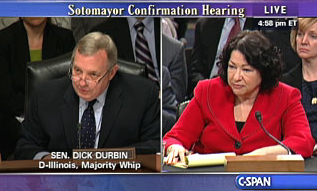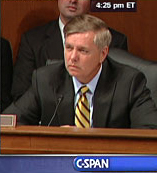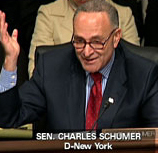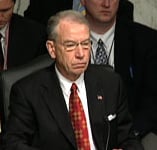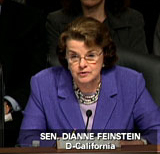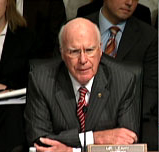Day 2, Confirmation Hearings: Do You 'Have a Temperament Problem?' Sen. Graham Asks
Editor’s note: Click here for more Sotomayor hearings coverage.
5:20 p.m. ET—Leahy ends the day. Eleven of 19 senators completed today’s questioning with the remaining eight to go tomorrow before the committee breaks into a private session with nominee Sotomayor.
Overall, most senators aimed their questions at discussions of the law behind Sotomayor’s 17 years as a judge. A few Republicans, Graham and Kyl mostly, also pursued questions about Sotomayor’s comments on her Hispanic heritage. It’s likely that pattern will persist tomorrow as two Republicans and six Democrats use their half-hour question periods. The gavel is scheduled to come down at 9:30 a.m. ET.
4:55 p.m.—Sentencing questions, no answers. Sen. Dick Durbin (D-Ill.) picks up Linda Greenhouse’s Becoming Justice Blackmun. Durbin points to Blackmun’s quote that he will cease to tinker with the death penalty.
“What’s Sotomayor’s view on the death penalty?” he asks. She mostly passes on a reply. But Durbin emphasizes his concern about courts following up on assuring plaintiffs about DNA, etc.
Durbin moves on to sentencing. He said he voted for the disparity in crack powder sentencing. “Now we realize we made a serious mistake. Most such criminals are African-American, whereas they are a minority in using cocaine.”
Sotomayor again passes on an answer. She acknowledges Durbin’s interest but says as a judge, she must pass on a specific answer.
4:50 p.m.—Puerto Rican Legal Defense Fund. Graham asks about Sept. 11 and whether we are at war. We are, Sotomayor says. Graham asks if she is familiar with military law. Not really, she responds. “Well,” he says, “Do you think there are people out there planning our annihilation?”
Graham tells Sotomayor to look at the law of war before the next round of questioning. He says that under the law, there is no time limit to release a member of the enemy.
Graham now inquires about the Puerto Rican Legal Defense Fund (now the Puerto Rican Legal Defense and Education Fund). Sotomayor replies that she was on its board for 12 years.
“Are you familiar with what the fund said about taxpayer-funded abortion?” Graham asked. Sotomayor said no. “The fund says to deny that is like treating women as if they were slaves.” He asks if she was aware of that.
No, she says. As a board member, that was not within her understanding.
She says she knows the fund was involved in public health issues. “Is it a public health issue?” Graham asks. “The fund was getting involved in it.”
4:30 p.m.—“A temperament problem?” Sen. Lindsey Graham (R-S.C.) goes back to Sotomayor’s speeches. He suggests how they differ from her answers today. “I hear you today, and I think I’m talking to Judge Roberts,” he says. “It’s like you’re a strict constructionist.”
“We’re trying to figure out who are we getting,” said Graham. “Don’t go into writing speeches.” He asks Sotomayor if she is a legal realist or a strict constructionist.
“I’m someone who doesn’t use labels in my work,” she says.
Graham come across like professor Kingsfield: Hanging out questions, subtly trying to lead Sotomayor but not letting out where he is taking her.
He quotes an article slamming Sotomayor for being a “terror on the bench,” being nasty to lawyers, a bit of a bully. “You stand out on the 2nd Circuit like a sore thumb,” he says.
In response, Sotomayor agrees that she is a challenger. But the 2nd Circuit is a hot bench, she says.
“Yes,” says Graham, “but they single out you more than others.”
“Do you think you have a temperament problem?” he asks.
“No, sir,” she responds.
“But,” says Graham, “these statements stick out; this is pretty tough stuff.”
Graham moves to the “wise Latina” statement. “For a long time, a lot of talented women are asked, can you type?” he says. “But your speeches don’t say that to me. They say there will be a day when there will be more of us, and we’ll change the law.”
“The one thing I’ve tried to impress upon you,” he says. With his head leaning on an arm, he searches for the “wise Latina” quote. He asks her to say it for him. Sotomayor is embarrassed about it.
“In politics, you got to watch what you say because you don’t like what you’re going to get,” he says. She responds that if those words were taken out of context, they might.
Graham says he’ll overlook the statement when voting for her. Sotomayor says that she hopes that we’ve come to the point where we judge a person on their experience and not their words.
“Yes,” he says, “if that comes from this hearing, we’ve done the world some good.”
From the Web:
Asked today by Graham about published claims that she sometimes bullies lawyers, Sotomayor said she’s no bully but is known for asking tough questions, reports the Blog of Legal Times. “My reputation is that I ask the hard questions, and I do it for both sides,” she told the senator.
Like other confirmed nominees before her, Sotomayor remained composed and was so cautious in what she said, NPR reported, that Graham at one point remarked: “I listen to you today, I think I’m listening to [Chief Justice John] Roberts.”
4 p.m.—Rulings and empathy. Sen. Charles Schumer (D-N.Y.) works in an opposite approach from the arguments of Republicans. He cites a series of cases that would prompt a judge to empathize with the plaintiff. But, he notes, Sotomayor was required to rule against the individual because the rule of law required that.
For example, in a case seeking liability for a TWA plane crash off Long Island, Sotomayor had to rule against the plaintiffs. Her point, she says, that despite the sadness, the rule of law offered another result.
From the Web:
Countering Republican criticism that Sotomayor may be influenced by her background as a Latina growing up under difficult circumstances, Schumer said he wanted to put on the record that she does indeed follow the rule of law, reports the Top of the Ticket blog of the Los Angeles Times. “No colleague has pointed to a single case in which you have attempted to change existing law or otherwise,” the senator stated.
A CQ Transcriptions account of Schumer’s discussion with Sotomayor is provided by the Washington Post.
3:35 p.m. 10-minute break.
From the Web:
No-frills coverage by some media emphasized the seemingly routine nature of the confirmation hearings, writes an Associated Press television critic. The most eye-catching development, he says, was the bright red jacket worn today by Sotomayor.
The “cardinal hue” was sufficiently solemn for the occasion, yet stood out due to a lack of fireworks in the questioning, writes Frazier Moore. The famously doomed nomination in which Robert Bork was “borked” for a Supreme Court seat in 1987 is legendary, he notes, yet many probably didn’t even notice at the time what he was wearing.
3:20 p.m.—Back to “wise Latina woman.” Kyl brings out speeches from Sotomayor in which she says women and people of color will make a difference in the process of judging. He concludes that her speeches back that up.
“The clear inference is that it’s a good thing that this is happening,” Kyl said. “You seem to embrace that there will be difference.”
In response, Sotomayor backs up her record of 17 years, and that says it has not been influenced by her background or biases. There are occasions where she has had regard for a party, but that, no, the law requires a different result, she says.
“The life experience enhances the judging,” she says. “Our system is enriched by a variety of experiences. I don’t think anybody quarrels that different people benefit the bench.”
It’s hard to know in this line of discussion who exactly is offering conflicting information. Kyl appreciates differences but worries when they are expressed on the bench. Sotomayor counters that she is inspiring people of different demographics and that the act of judging would not be affected.
Kyl pulls off: He says she is conflicting the issue. “You almost celebrate the difference,” he says. “You say it would be a good thing if we decide these cases differently.”
Regarding the “wise Latina woman” comment, Sotomayor says she was making a quip on the comment by O’Connor that a wise man and wise woman would make the same judgment.
3:02 p.m.—What’s in a judge’s heart? Sen. Jon Kyl, R-Ariz., returns to whether Sotomayor would recuse herself from Maloney if it came before the high court. The two go back and forth on whether she would recuse from other gun control cases that may come before the court. She backs away. “There are so many different questions to look at,” she says, regarding recusal.
Kyl cites a statement by Obama that “the law will take you 25 miles of the 26-mile marathon, but the rest of the decision is what’s in a judge’s heart.” Do you agree?
“No, sir,” says Sotomayor. “The law decides what a judge does.”
“Has there ever been a case where you’ve been guided by your gut?”
“Well,” says Sotomayor, “lawyers have said to me that I’ve been.”
Kyl follows: “Has there always been a legal basis for your opinions?”
“Exactly, sir,” says Sotomayor.
Kyl says Obama is clearly going to seek nominees to this court and others that have some agreement with his judging. But, he tells Sotomayor, some of her speeches lead him to believe there are other reasons besides law to make a decision in a case.
From the Web:
Perhaps the sharpest GOP criticism yet was made by Kyl, reports the Top of the Ticket blog of the Los Angeles Times.
As she testified that judges apply the law to facts, Sotomayor essentially fell into the senator’s lawyerly trap, the blog post recounts. In response, Kyl read an excerpt from what he said was a speech she gave at Seton Hall University in 2003: “To judge is an exercise in power. There is no objective stance. No neutrality. No escape from choice.”
Under questioning from Kyl, Sotomayor also at least arguably disagreed with President Barack Obama about the empathetic role of judges, according to the Washington Wire blog of the Wall Street Journal.
“Judges can’t rely on what’s in their heart. They don’t determine the law,” the nominee testified. “Congress makes the laws. The job of a judge is to apply the law.”
3 p.m. ET—“A judge should never rule from fear.” Feingold finally asks, “What do you have as a judge that would empathize with small-town Americans?” Sotomayor says she has lived in all sorts of places with friends who live there. “It’s important to know more than where I live,” she says.
Feingold goes back to Korematsu, the World War II decision that approved of Japanese Americans placed into detention centers. “Your opinion?” he asked.
“A judge should never rule from fear,” she said..
2:33 p.m.—Potential recusals. Sen. Russ Feingold (D-Wis.) asks Sotomayor about Sept. 11 and her views on opinions that involve Guantanamo Bay. Most questions are self-serving, and again Sotomayor declines to respond as a judge.
In Heller, Feingold asks about whether Sotomayor would recuse herself if the 2nd Circuit Maloney case came forward, but not if a similar case out of the 7th Circuit came up. It’s likely that one of the appellate cases will come before the court to follow up on a state’s right to issue gun control laws.
Sotomayor dances around this. She would recuse for Maloney for sure, she says.
Feingold’s questions veer into the area of where Sotomayor would go regarding key issues that are likely to come before the court in the future.
2:32 p.m.—GOP senators switched gears. Grassley and Sotomayor go into a discussion about several cases involving federal regulations. Despite yesterday’s insinuations about Sotomayor’s statements regarding her Hispanic heritage, the three Republicans so far have changed gears, leading Sotomayor on a more specific discussion of her rulings and her opinions on Supreme Court precedent. The discussions have been intricate, but any law professor would love the back-and-forth on constitutional ideas. On many answers, Sotomayor says she is unable to answer as a judge.
2:01 p.m.—Didden and Kelo. Sen. Chuck Grassley, R-Iowa, leads Sotomayor on the Supreme Court’s Kelo case, the 2005 case that expanded the rights of municipalities to seize private land for commercial case.
The two wander through the issues of takings, just compensation and other issues of the Fifth Amendment. As obvious to most, Grassley then pulls out the Didden v. Village of Port Chester case before the 2nd Circuit in 2006. Property rights critics of Sotomayor have pointed to Didden as an extreme decision.
(Just before she answers, another anti-abortion protester distracts the committee.)
In Didden, the question was whether Didden knew that the state was going to take his property for a public use. But, Sotomayor says, Didden declined to take steps previous to the seizure, so his right to sue was expired.
Grassley notes that Sotomayor issued a very short opinion denying Didden’s case. Adds Sotomayor: The case was not about Kelo, but about the New York statute of limitations. Thus, she says, it got a very short response.
From the Web:
As Senate Judiciary Committee members took a lunch break today during the Sotomayor hearing, another abortion protester apparently was gearing up for a noisy outburst at the outset of the afternoon’s proceedings before he was removed like the other individuals who have made their voices heard earlier.
Sen. Charles Grassley lightened the mood after order was restored, eliciting chuckles by remarking wryly: “People always say I have the ability to turn people on,” reports the Iowa Politics Insider blog of the Des Moines Register.
The quip got the biggest laugh in the hearings so far, reports the Hill’s Blog Briefing Room.
The abortion protest during the Sotomayor hearing yesterday by the plaintiff in the landmark Roe v. Wade case that legalized abortion decades ago has even caught the attention of celebrity blogger Perez Hilton. His post features a large photo of “Jane Roe.”
Another Associated Press article quotes highlights of the exchanges between Sotomayor and committee members today.
12:20 p.m.—Wrapping up the morning. Feinstein says that Sotomayor must go to court with the idea that Congress must legislate on all these issues, and the courts must not supersede their powers to do so. She finishes, and Leahy ends for lunch. Back at 2 p.m.
12:07 p.m.—Congress and the president. Responding to a Feinstein question, Sotomayor leads the committee on a long discussion about the interaction of the courts, Congress and the president over laws involving war. Sotomayor points to Justice Robert Jackson’s contribution to the Youngstown steel case that spells out how Congress can interact with the president.
Feinstein leads Sotomayor in involved discussions of the commerce clause, the First Amendment, other issues. The discussion is very long and intricate.
12 p.m.—Feinstein is up. During a break, Sessions recaps information about Miguel Estrada, the rejected Republican nominee who withdrew his name for an appellate bench in 2003. Sen. Dianne Feinstein (D-Calif.) wonders why the question of Estrada keeps getting brought up. “You see,” says Feinstein, “this is a totally different case.”
She cites that Sotomayor has agreed with Republican-appointed justices over the years. “Sotomayor is being mistakenly blamed for being an activist,” says Feinstein.
Feinstein delves into the background on abortion decisions, and then points out that the changes in the most recent Carhart decision. Feinstein asks: “Does a woman have a right to have her health considered?”
“Yes,” says Sotomayor, “that continues to be the case.”
From the Web:
What a difference nearly 40 years makes. In 1971, Norma McCorvey was poor and pregnant when she became the “Jane Roe” plaintiff in the case that led to the Supreme Court’s landmark Roe v. Wade abortion ruling in 1973. Now, at age 61, she is making new headlines as an abortion protester who disrupted yesterday’s hearing, as articles in the Washington Post and the Caucus blog of the New York Times recount in detail. Several abortion protesters were arrested yesterday after protests at Sotomayor’s confirmation hearing.
11:45 a.m.—Ricci again. Hatch brings up the Ricci case. He delves into the procedure of the case, the initial three-judge per curiam opinion, and the follow-up full court opinion.
Sotomayor again repeats that the issue was about the city of New Haven’s test and whether it was of disparate impact under Title VII. There’s little doubt at this point from Sessions’ and Hatch’s questions that the Republicans are going to bore in on this case.
Hatch gets reflective. “You have nothing to do with this,” he says, but he points to reports that the People for the American Way have criticized Frank Ricci.
“That’s the kind of stuff that doesn’t belong at a confirmation hearing,” Hatch says. Sotomayor agrees.
From the Web:
People for the American Way was rushing out a response to a claim by Sen. Orrin Hatch that it might have been “smearing Frank Ricci,” reports the Top of the Ticket blog of the Los Angeles Times.
“It is not a smear to point out than an individual used the law to protect his interests,” the group says in a written statement. “It’s time to get past this distraction and have an honest discussion about the importance of anti-discrimination laws for all people.”
11:29 a.m.—Second Amendment. Sen. Orrin Hatch, R-Utah, kicks off a very intricate discussion about precedent and how it applies in Second Amendment cases. He asks about the case of D.C. v. Heller, the Second Amendment case from last year, and inquires about whether the case also applies to the states.
Sotomayor and Hatch go back and forth on the question of whether the right to bear arms is fundamental, that is, whether it applies to all citizens rather than just the federal government.
In this year’s Maloney v. Cuomo, Sotomayor said that the Second Amendment applies only to the federal government but not to the states. The case involved numchuks martial arts devices. Sototmayor and Hatch go back and forth on the issue of fundamentalism.
11:08 a.m. A 10-minute break.
10:53 a.m.—SCOTUS precedent. Kohl asks about the Kelo case, the famous case from New London, Conn., under which the court expanded the takings clause to allow the city to take over an individual’s home. “Assuming,” Kohl said, “you become a Supreme Court justice.”
Kohl next picks up on Griswold, the 1960s case involving the right to privacy. Basically, he’s hitting most of the main controversial cases from the last 50 years. In response, Sotomayor insists consistently that as precedent she is bound to abide by it. It’s a pretty regular back-and-forth.
(Any law students watching the confirmation hearing will get a great lesson about how to use leading questions. Compare, for example, Republicans edging toward doubt, with Democrats emphasizing favorability. More on this later …)
From the Web:
An Associated Press article also “translates” what is being said at the hearing and what it really means. For example, several answers by Sotomayor actually mean “I’m not as liberal as they say,” the article recounts.
Another Associated Press article reports some of the key exchanges between Sotomayor and committee members.
On another front, Sotomayor likes the concept of cameras in the supreme court, reports the Blog of Legal Times.
10:35 a.m.—Cardozo an inspiration. Sen. Herb Kohl (D-Wis.) delves into Sotomayor’s record of reversals by the Supreme Court. He focuses on her 17 years of judgeship and says this is the basis by which we should discussing her background.
Kohl then pitches one: What about balls and strikes?
“Analogies are always imperfect,” Sotomayor said. “Judges should be impartial and bring an open mind to each case before her.”
Kohl wants to know which current justices she most admires and who she would agree with. She blows past that and says each justice deserves respect.
From the past, she admires Justice Benjamin Cardozo. She admires his respect for precedent for other branches as well. “That’s how I address the law,” she says: case by case, comparing the law with the facts.
10:22 a.m.—Exploring Ricci. Sessions picks up on Ricci case. He goes over the Supreme Court decision. Sotomayor again emphasizes that the Supreme Court enacted a new test.
Curiously, Sessions refers to 2nd U.S. Circuit Court of Appeals Judge José Carbanes’ disagreement with the three-judge panel that issued the first Ricci decision. Sessions refers to Carbanes as another Hispanic judge. Both he and Sotomayor let that remark go.
He emphasizes the fact that Carbanes insisted that the 2nd Circuit issue a full decision, rather than a per curiam case.
Sotomayor: The appellate circuit based its decision on a large 78-page lower court case. It was “undisputed” that there was agreement that there was disparate impact.
In the end, she says, there was tremendous regard for firefighter Ricci. But the panel relied on precedent.
From the Web:
In both the Ricci and Heller cases, Sotomayor emphasized today that her decisions followed clear precedent, reports the Blog of Legal Times.
10 a.m. ET—“We are not robots.” Sen. Sessions begins. He returns by boring into many of her previous quotes. Had she spoken that clearly in the past, he says, there may be no questions asked.
“Appellate laws find precedent and that has policy implications,” she says. The speech was set in context, she adds.
He asks if there is any chance that a judge should allow their prejudices to enter. “Never,” she replies. “Life experiences have to influence you. We are not robots.”
Sotomayor and Sessions plunge into a back-and-forth over the extent of feelings and how much they influence judging. Sessions consistently asks whether Sotomayor’s previous statements contradict what she is saying now about a more studied look at emotions.
She disagrees. “At no time have I let my sympathies indicate the outcome of my cases.”
From the Web:
“There are some situations where experiences are important in the process of judging,” says Sotomayor, in response to a question from Sessions, reports the Campaign Spot blog of the National Review.
But Sessions wasn’t persuaded by Sotomayor’s explanation that she follows the law and was discussing policy in her “wise Latina” comment, recounts the Top of the Ticket blog of the Los Angeles Times. “You have suggested that a judge’s background and experience will impact their decision, which goes against the American ideal that a judge will be fair to every party, and every day when they put on that robe they will put aside their personal prejudices,” he said.
So far, observers say, today’s hearing has largely focused, as expected, on political showmanship. “What we’re witnessing so far has little to do with law and lots to do with PR,” writes the Second Opinion blog of the Baltimore Sun.
“The hearings spend little time on issues that matter to anyone but students of constitutional law and people at the extreme ends of the political spectrum,” agrees attorney Allan Levin of Cozen O’Connor in an op-ed piece in the Atlanta Journal Constitution.
However, the hearings do give a read on the relative strength of the political parties, allow public opinion to influence the supreme court, even though the justices aren’t supposed to be affected by it, and offer a candid view of potential presidential candidates on the Senate Judiciary Committee, he writes.
“Let’s not waste this opportunity to judge our senators on how they perform their duty of evaluating nominees to the highest court.”
After what the Washington Post described as “a surprisingly strong critique of her fairness” by Republicans during yesterday’s hearing, Sotomayor continued to be a target of further grilling by Sessions and his GOP colleagues today.
As they continued to focus on Ricci and Sotomayor’s “wise Latina” comment, among other points of controversy, an Atlantic writer says that the so-called objectivity on which much criticism of Sotomayor is grounded is actually a myth. “Whether we see it or not, we all are a product of our experiences, and those experiences give us a particular set of lenses through which we view the world,” writes correspondent Lane Wallace. “They influence how much weight we give to different factors in an argument, and what we tend to believe, out of what we’re told.”
In response to questioning by Sessions, Sotomayor insisted her background won’t affect her judicial impartiality, reports the New York Times.
A “Platonic ideal of complete, pristine objectivity” is difficult or impossible to achieve. So the GOP members critical of Sotomayor might be smarter to ask themselves what a wise Latina would do, writes Eugene Robinson in the Post Partisan blog of the Washington Post.
9:45 a.m.—Ricci and “wise Latina”: Leahy asks Sotomayor about the Ricci case and precedent.The issue in Ricci, she says, is what the city should do. “This is challenge to a test,” she says.
The employer had to defend the test. She goes over the burden test for Ricci and Title VII.
She explains that the case involved New Haven’s decision based on precedent or what it was required to do. The panel concluded that city’s move was lawful under established law.
She replies that the Supreme Court set a new standard from a different area of law.
Leahy then asks her about the controversial “wise Latina quote.”
“No words I have ever written or spoken have gotten that much attention,” she says. “I was trying to inspire Latino students to believe that their lives could be inspired. That they could become anything that they wanted to become.”
She continues, “No domestic group has an advantage in judging.” She agrees with Justice Sandra Day O’Connor that men and women were equally capable of being wise and fair judges. Judges disagree about legal outcomes all the time, at least, on the same cases.
From the Web:
As the Sotomayor confirmation hearings began yesterday, one key focus both there and among observers was her controversial “wise Latina” comment. In a CNN opinion article today, Laura Gómez, a law professor at the University of New Mexico who attended a conference at which Sotomayor made the comment, talks about what she thinks it meant.
Sotomayor herself also explained the ‘wise Latina’ comment in her testimony today, saying that she believes “every person has an equal opportunity to be a good and wise judge, regardless of their background and life experiences,” notes the Washington Wire blog of the Wall Street Journal.
9:30 a.m.—Remembering the prosecutor’ s office. Senate Judiciary Committee Chairman Patrick Leahy (D-Vt.) convenes today’s hearing. Judge Sonia Sotomayor is dressed in a bright red jacket today. Red is for Republicans; yesterday’s blue was for the Democrats.
Leahy says Sotomayor is the first nominee in more than 50 years who served as federal judge at trial and appellate court. He asks her what qualities a judge ought to possess.
She emphasizes that others yesterday talked about judge’s duties. “The process of judging is keeping a an open mind, not coming to a decision with a predecided outcome.”
Leahy refers to the case of the “Tarzan burglar,” who moved into apartments and molested and killed. Sotomayor prosecuted this. “Did that shake your views as a lawyer or as a judge?” he asked.
Richard Maddicks, the “Tarzan burglar,” committed a series of burglaries and murders in a bloody three-month spree form 1981 to 1982 in Central Harlem by swinging from rooftops on ropes and crashing through apartment windows with his gun blazing.
Maddicks’ one-man crime spree left a trail of shattered lives, including three deaths and many seriously injured. The police investigation that led to the arrest of Maddicks covered 23 incidents over a 12-month period, 11 of which were the subject of a 37-count indictment charging Maddicks with multiple counts of murder, burglary, assault and assorted crimes.
She says that she become a lawyer in the prosecutor’s office and owes a lot to Robert Morganthau, Manhattan district attorney. “In law school, you learn theory. In the prosecutor’s office, law isn’t legal theory, it’s facts”
Her delivery is very poised and deliberate.
Monday overview. But for a few disruptions in the audience, the first day of the Senate Judiciary Committee’s confirmation hearings for Judge Sonia Sotomayor went along smoothly. After a morning filled with statements by the senators, Judge Sotomayor made her introductory statement about 2:50 p.m. It lasted around 10 minutes.
The second day is slated to begin today at 9:30 a.m. EDT. Each senator will get about a half-hour to question the judge. It is expected the questioning will last until tomorrow.
At yesterday’s opening, the Democrats and Republicans each revealed the outlines of their arguments. Most GOP senators dwelled on Sotomayor’s 2001 statement that “a wise Latina woman with the richness of her experiences would more often than not reach a better conclusion than a white male who hasn’t lived that life.”
Sen. Lindsey Graham (R-S.C.) said that had he made a similar kind of statement, he would never have been confirmed to a seat. Several senators have also cited Sotomayor’s involvement with the Puerto Rican Legal Defense and Education Fund, and have questioned some of the work that she did with that organization.
From the Web:
On Monday, Orrin Hatch was soliciting questions for Sotomayor from constituents on Twitter, MSNBC’s First Read blog.
Write a letter to the editor, share a story tip or update, or report an error.
